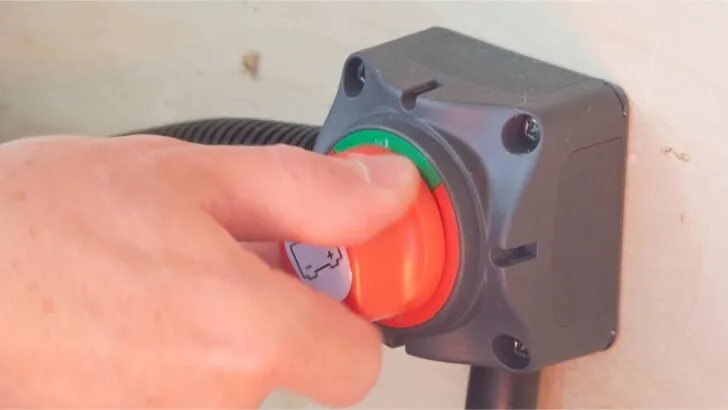If you’ve wondered how to store your lithium RV batteries for the winter to keep them in good health, there are some important things to keep in mind. For example, LiFePO4 batteries (Lithium Iron Phosphate, the most common lithium RV battery chemistry) shouldn’t be charged when the cells are below freezing (32F/0C), as that can seriously damage them.
Fortunately, the BMS (battery monitoring system) in most lithium batteries won’t even allow them to accept a charge when the cells are below freezing. But there are still other things to consider.
We all know how expensive LiFePO4 batteries can be. If your RV will be in long-term storage and exposed to extremely low temperatures for an extended period of time, it’s important to know how to protect the batteries from damage. In this post, we’ll talk about safely storing lithium batteries in cold weather.
How to Store Lithium RV Batteries for Winter
Again, it’s important to note that when we say “lithium” RV batteries, we’re talking about Lithium Iron Phosphate (LiFePO4) batteries only. “Lithium” and “Lithium Ion” are generic terms for various battery chemistries. LiFePO4 is very stable, and the short-circuiting and battery fires you may have heard about with lithium batteries are virtually non-existent with LiFePO4 battery chemistry.
So the question we’re really answering is “How do you store LiFePO4 batteries in cold weather?” Here are the general steps you’ll want to follow:
Charge the Battery
You’ll want to begin by properly charging your battery. A well-charged LiFePO4 battery can survive winter storage in freezing temperatures. Make sure batteries are stored with enough charge to ensure that small voltage drops over the winter won’t take the battery’s state of charge down too low.
Many Lithium RV battery manufacturers recommend charging them to between 50%- 100%. But the longer the period of storage will be, the higher you’ll want them charged at the beginning.
Note that they’ll typically lose about 2%-3% of their charge per month while in storage based on the average discharge rate of a typical LiFePO4 battery. So a very long period of storage in very cold conditions may mean fully charging them first.
Also note that when the internal temperature of lithium RV battery cells drops below 32°F, the cells can’t accept a charge. So be sure to charge your lithium RV battery in warmer temps and not when the temperature is already below freezing.
Here are a few important additional notes about charging LiFePO4 batteries when you’re in very cold temperatures:
Never Charge Below 32°F /0°C
If you charge a LiFePO4 battery when its cells are below 32°F, a chemical reaction can occur that can cause permanent damage to your battery. But again, even if you try to charge a lithium battery when the cells are below freezing, the BMS should stop you from committing a self-inflicted mistake, and prevent them from accepting the charge at all.
Warm the Battery Before Charging
If your battery is stored in an RV located in very cold temperatures, there are a couple of ways you can warm up a LiFePO4 battery to safely charge it:
- Heat the RV: This will work just fine as long as your battery is located in a heated area of the RV. If you have a travel trailer with the batteries out on the tongue, of course, they won’t be warmed by turning on the RV’s furnace.
- Rely on the Battery Management System: Your battery’s BMS may offer a heating function. If so, you should be able to read the temperature of the battery so you’ll know when it’s safe to charge it. Some of the most popular lithium batteries available today include a self-heating function. This game-changing feature makes a huge difference when cold-weather RVing.
Disable the Heating Function
If your battery is equipped with a heating function, be sure to disable it before storing. Since this is usually a self-heating function (using the battery’s own power to heat itself), the last thing you want is for the battery to drain itself during cold weather as it tries to keep itself warm for no reason.
Keep in mind that the heating function is to allow the battery to accept a charge in cold conditions. But with the rig stored for the winter with the battery charged from the outset, it shouldn’t be necessary to charge it during that time.
Disconnect From Any Load
LiFePO4 battery manufacturers recommend disconnecting the battery from any load/drain. If your RV has a battery disconnect switch, you can use that for this purpose. However, if you’re not able to confirm that your RV’s battery disconnect switch eliminates all parasitic drains, you may want to completely disconnect the battery from the RV.

An RV battery disconnect switch is a convenient way to temporarily disengage your rig’s house batteries from the electrical system.
Check any specific instructions from the manufacturer of your lithium RV battery. For example, Battle Born advises disconnecting all lithium RV batteries from the battery bank during storage.
Turn Off/Disable Charging
Be sure to turn off or disable any battery charging systems, including solar panels, if you have them.
Store in a Dry, Temperate Location
If your RV won’t be stored in an area that’s subject to extreme temperatures, you can leave your batteries in the rig. However, if your RV will be in extreme cold, you should remove the batteries from the rig and store them in a location where the temperatures aren’t so extreme.
Always check with the manufacturer of your lithium batteries for any other specifics that they may require for safe storage. That includes ideal temperature ranges that may require moving the batteries to a more temperature-controlled location and any requirements regarding charge level.
Most lithium RV battery manufacturers will give you ideal temperature ranges. For instance, Battle Born notes that their batteries can be stored in temperatures down to -10°F.
Periodically Check the Battery State of Charge
If you’re storing your lithium RV battery for an extended period of time (six months or more, for example), periodically check the battery’s state of charge, and recharge as necessary (but only if they’re warm enough)!
Are Lithium RV Batteries Worth It?
This is a great question and an important one for you to be able to answer for your RVing style and needs. That’s because high-quality LiFePO4 batteries can be expensive. If you decide that lithium RV batteries are right for you, be sure to use our RVGEEKS coupons to save yourself some money.
Battle Born Batteries:
Xantrex Lithium Batteries
We've got long-term experience with Xantrex products (our first motorhome came with a Xantrex Freedom 458 Inverter/Charger), and have always had a good experience with them. In our Mountain Aire...Show More
We've got long-term experience with Xantrex products (our first motorhome came with a Xantrex Freedom 458 Inverter/Charger), and have always had a good experience with them. In our Mountain Aire we've enjoyed many years of boondocking freedom thanks to our Xantrex lithium battery, solar panels & charge controllers, and pure-sine inverter/charger.
Now, you can save 5% by ordering direct from Xantrex's online store when you use the Promo Code "RVGEEKS"
Watch our video about installing our Xantrex lithium battery
Choose from several Xantrex lithium batteries, accessories, and more (to come!). Shipping to both the US and Canada available!
Show LessIn our experience, they’re well worth the investment. That’s especially true for die-hard boondockers like us. However, all RVers need to determine which battery type is best for them. To help you sort this question out, check out our post, “Are RV Lithium Batteries Worth It?” You can also check out our post on three big misconceptions about lithium RV batteries.
Finally, here’s a video where we take a LONG, DEEP dive into comparing the different RV battery types to help you decide which would most likely be best for you:
Final Notes on Storing Lithium RV Batteries for Winter
It bears repeating that we should always check manufacturer recommendations when storing a battery of any type including LiFePO4 RV batteries, especially in cold temperatures.
Also, if you’re using your lithium RV batteries in cold temperatures, be aware of the charging recommendations and make sure the batteries are warmed up when charging, or equipped with self-heating capability.
Also note that cold temperatures increase the internal resistance of a battery which can lower the battery’s capacity. This means that your battery may not be able to retain a charge as well or release as much energy in cold temperatures as it does in warmer temperatures.
Free RVing Tips, Tricks, Reviews & Giveaways
As 20-year full-timers, we share everything we’ve learned about RVing over the years. Join our online community to receive a wealth of great RVing knowledge delivered daily to your inbox.
Whether you’re a new RVer or a seasoned full-timer, you’ll love the wide range of RVing topics we cover. Don’t miss a single article or any of our famous Giveaways. Subscribe to our newsletter today!



